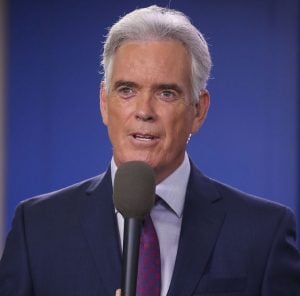John Roberts Talks Advocating for Your Own Health
- Fox News’ John Roberts recently went through a health scare that reiterated how important it is to seek answers when you feel something is up with your body.
- Roberts had to see four doctors before one found a blockage in his heart that could have been fatal had it not been caught.
- Experts often stress how crucial it is to speak up when seeking medical treatment — after all, you know your body better than anyone.
They kept telling him that they couldn't solve the mystery of severe pain in his hands and forearms. But he persisted in his search for an explanation, finally visiting a fourth physician who came up with a diagnosis that he believes saved his life.
Read MoreAdvocating for Your Own Health
"You've got to keep pushing and pushing and pushing. You have to be your own best advocate when it comes to getting good medical care," he tells SurvivorNet. Roberts' condition didn't involve cancer, but an issue in 2018 just as dire: his heart. An artery was 90% blocked, which required insertion of a stent — and his problems didn't end there.After passing out in the kitchen at home one evening and feeling faint while driving his daughter to a music lesson, he went to a cardiologist who found that his stent needed to be repositioned.

He recently returned as co-anchor of his weekday show, America Reports with John Roberts & Sandra Smith, on Fox News after having a pacemaker installed to steady an irregular heartbeat.
Roberts also spoke about how he keeps up with regular health screenings, noting that cancer screening is part of his health routine.
Monitoring Lung Cancer Risk Factors
"I've had a number of CAT scans of my lungs and abdomen and everything's good" with the exception of some residual issues from having contracted COVID-19, he says. "I'm pretty confident that I'm not going to die from cancer in this next little while.”
Not that he doesn't have risk factors. Growing up in Toronto, Canada, Roberts took up smoking as a teenager. The intensity of the news business led him to burn usually through a half a pack a day, closer to a full pack during intense production periods or in war zones.
He had finally kicked the habit, but resumed while covering the Iraq War in the 2000s because smoking "both keeps you awake and quells hunger pangs. And we all thought we were going to die anyways so it didn't seem to matter (much) at that time." With that period of his life behind him, he quit smoking at about age 40.
For former smokers, lung cancer screening is generally recommended if you were a heavy smoker (who smoked a minimum of 20 pack years), quit within the last 50 years, are between the ages of 50 and 80, and are in fairly good health.
Another risk factor was covering wars that might not have killed him, but instead left him concerned about lingering health effects. The Iraq War's aftermath resulted in a "marked change" in his health, he said. "My cardiovascular system was never quite the same" and he now lacks the stamina that he used to have.
Being Vigilant About Health
"I wasn't ever near one of those infamous burn pits, but there was a lot of stuff in the air during that war from the fighting," he said. A newsman's life can mean that health problems can crop up at the worst possible time, such as on an overseas assignment. Roberts' heart problem occurred just before he was due to cover then-President Donald Trump's trip to Europe that culminated in his summit with Russian President Vladimir Putin in Helsinki, Finland.
He said he had already started suffering the aching hands and forearms that became so severe that the pain would wake him at 5 a.m. He went to a hospital emergency room before departing, had an EKG test and a doctor said they didn't see anything abnormal, including with his heart.
The leg to London came during a heat wave, in which Roberts said he almost passed out. A member of his crew said he looked so sickly that he implored him to visit an emergency room, where another doctor conducted an EKG and other tests before Roberts recalls him proclaiming, "I'm not sure what's wrong with you, but it's not your heart."
Dr. Zuri Murrell explains why it’s so important to advocate for yourself if you think there’s something up with your health.
Roberts was no ordinary patient. For one, he has quite a bit of medical knowledge because he was pre-med in college and then the chief medical correspondent for CBS News in the late 1990s. For another, he says some of his closest friends are doctors.
Still feeling rotten after returning to Washington, D.C., Roberts visited a cardiologist who gave him the same uncertain diagnosis. Roberts asked around and was referred to yet another, a heart specialist at a Washington hospital.
"I went in, they put me on the table, they shot me full of dye and found out I had a 90% blockage," he said.
Saved from the blockage that could have been fatal, Robert said he now knows not to ignore strange symptoms.
"I didn't accept three experts' views because I knew something was wrong."
Doctors, like many professionals forced to deal with a mystery, may assume that the simplest explanation is the most likely one.
"But when it comes to medicine," Roberts said, "the simplest is not necessarily the right thing."
Learn more about SurvivorNet's rigorous medical review process.


